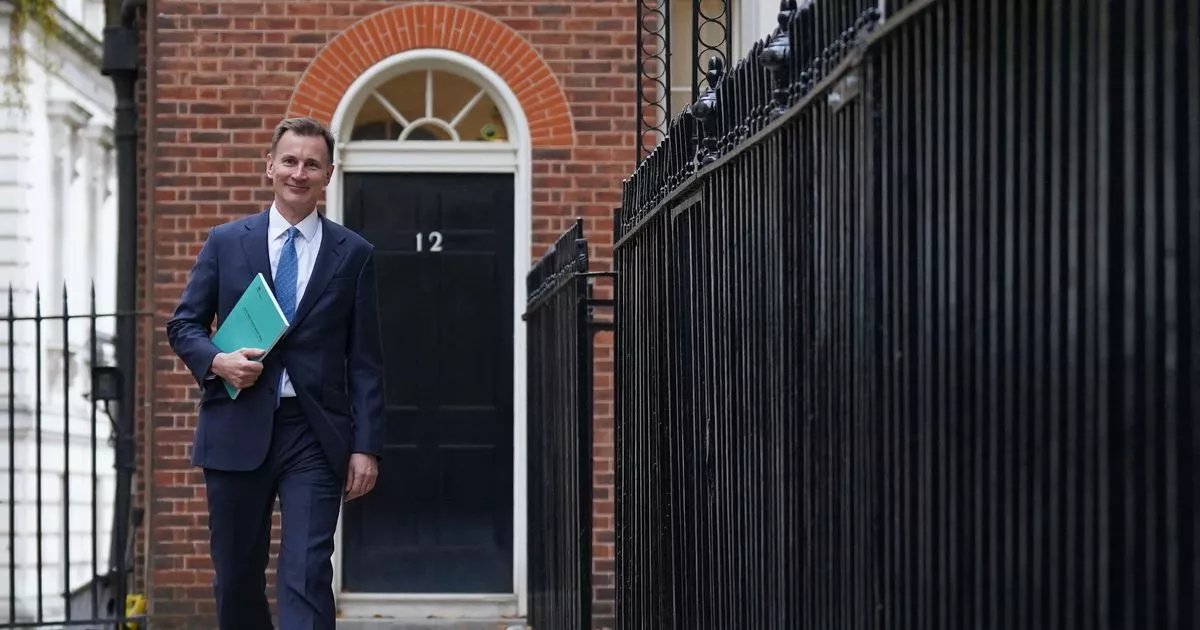Budget 2024 predictions are quite diverse, ranging from potential vaping taxes to changes in child benefits. Tory Chancellor Jeremy Hunt is expected to share what could be his final Budget before the general election next week.
Hunt is under a lot of pressure from fellow Tories to reduce taxes, but he also has to answer to calls for clarity on public spending, especially with fears of another round of severe austerity cuts looming.
This situation arises after Rishi Sunak’s claim that the economy had “turned a corner” was disproved two weeks ago after it was revealed that Britain had fallen into a recession.
Read more: Train passenger with ticket gets £100 fine after breaking unknown rule
Read more: 10,000 people a year paying HMRC £3,000 they don’t owe
The Chancellor will present his budget where he will outline the Government’s tax and spending plans at approximately 12. 30pm on March 6.
This article from The Mirror looks at what the Chancellor might announce and what it could mean for you. Next week, before the pre-election Budget, Jeremy Hunt is believed to be considering cutting either National Insurance or Income Tax.
There is considerable pressure on the Chancellor from Tory MPs to cut taxes before the country votes. He has been weighing his options. According to The Times, a 1% cut in employees’ National Insurance could be introduced, carrying a £4. 5 billion annual cost.
This would follow a 2% reduction announced at the Autumn Statement last year. But even if this change goes through, taxes look set to reach record levels due to covert Tory taxes. Income tax thresholds usually rise along with inflation. However, Mr Sunak froze them during his time as Chancellor from 2022 until 2028.
The Institute for Fiscal Studies think-tank has warned Rishi Sunak not to announce any cuts unless he can demonstrate how they will be funded. The current spending plans after the election already mean more cuts to public services that are not protected.
Vape tax
Rishi Sunak’s crackdown on vaping continues as the Prime Minister and his Chancellor consider a new tax. At the moment, vaping liquid is subject to VAT, but there could be an announcement of a separate levy at next week’s Budget.
The Mirror first reported in December that ministers were considering following the example of other European countries like Germany and Italy, which already have taxes on vapes.
A 10ml bottle of e-liquid, which a typical vaper would use in a week, currently costs about £4. However, in Germany, a £1.
40 vape tax is added to 10ml bottles, and there are plans to double this to £2. 80 in 2026.
Reports this week also suggested that the new levy could result in higher taxes for products with more nicotine.
Tobacco duty
If a new vape tax is introduced, these products will still be cheaper than tobacco. In the Autumn Statement in November, the Chancellor announced that all tobacco products would increase by 2% above inflation.
There was also a significant 10% increase on hand-rolling cigarettes. In another hit to smokers’ wallets, Mr Hunt might introduce an additional one-off rise in tobacco duty at the Budget next week.
Reports suggest that after the Budget, a pack of 20 cigarettes could cost around £16 on average.
99% mortgage scheme for first-time buyers
The Chancellor is reportedly considering a plan to allow first-time buyers to take out mortgages with just a 1% deposit, aiming to assist young people onto the property ladder. Currently, the mortgage guarantee scheme allows first-time buyers to secure a mortgage with a 5% deposit until June 2025.
However, if Mr Hunt introduces “99% mortgages” as widely reported, it would mean someone buying a house at the average UK price of £288,000 would need to put down a deposit of just £2,800 – rather than £14,400.
But experts have cautioned that 1% deposits could be a “short-term” solution as it does not address the chronic housing shortages and could potentially drive up prices even further. Annual figures published in November showed the Tories had failed to meet their manifesto pledge to build 300,000 new homes a year.
Stamp duty cuts
It remains uncertain whether the Chancellor will adjust the stamp duty system. Under the current system, the amount a person pays depends on the value of the property – or whether they are a first-time buyer.
In England and Northern Ireland, if a property costs less than £250,000, there’s no stamp duty to pay. But if it’s more than that, the rules get a bit complicated.
5% in stamp duty is paid on the part of the property costing between £250,0001 and £925,000, 10% on the part between £925,001 and £1,500,000, and 12% on any value above £1,500,000. If you’re a first-time buyer, you only need to start thinking about stamp duty if the property you want to buy costs more than £425,000.
Last month, Robert Jenrick, who used to be the Tory housing minister, was chatting to the Treasury. He has some ideas for how they could make buying a home a bit cheaper.
He asked them to think about reducing the amount of stamp duty people have to pay. He suggested they could increase the thresholds (which would mean fewer properties would be affected), reduce the rates, or even scrap the whole thing.
The Institute for Fiscal Studies seems to agree. They’ve said that stamp duties “are particularly damaging taxes and should be at the front of the queue for growth-friendly tax cuts”.
Fuel duty freeze
Fuel for cars, like petrol and diesel, has had the same level of extra tax – called fuel duty – of 52. 95p-a-litre since way back in 2011.
When Mr Hunt was talking to MPs last year, he wouldn’t say whether this would stay the same. All he said was, “you’ll have to wait until the spring Budget”.
But next week, when the Chancellor sets out the Budget, it looks very likely that he will freeze the fuel duty again. This will be the 14th year in a row it hasn’t gone up.
And the 5p-a-litre cut in fuel duty, which they brought in last year to help people when global prices went up really high, could be kept for another year.
Inheritance tax
Changes to inheritance tax have been considered by the Treasury for some time. This is a tax paid on the value of things (like houses and money) that people inherit when someone dies.
There’s been talk about reducing this tax for the wealthiest families in the country. But, it now seems more likely that we’ll hear about this in the Tories’ general election manifesto rather than in next week’s Budget.
Just 4% of UK estates paid inheritance tax in 2021, and most people will never have to pay it. Scrapping the tax altogether could cost the government at least £7 billion per year.
The One Nation group of Conservative MPs has warned the Chancellor against “prioritising tax cuts that only benefit the most wealthy, such as the Inheritance Tax”. They have instead urged him to abolish stamp duty for people who are downsizing.
Household Support Fund
The Household Support Fund was first launched in 2021 to provide extra money to councils to help low-income households with essential food and energy costs. The Treasury extended the scheme for 12 months last year, but it is not yet known if it will continue beyond March 31.
Mayors from across the country have urged the Chancellor to extend the “vital lifeline” for the most vulnerable families, saying it has been used to boost food bank supplies, support victims of domestic violence, and provide food vouchers for at-risk young people. Ending the scheme could spark a major row.
Read more: DWP scraps £20 application fee from this week to ‘ensure no child misses out’
Child Benefit
There had been speculation that the Chancellor might extend child benefit to thousands of middle-income families by raising the threshold at which the benefit is gradually withdrawn. Since 2013 it has been frozen at £50,000 while those earning over £60,000 lose the benefit altogether.
But there have been warnings it unfairly penalises single parent families. This is because a couple can have a combined income of up to £100,000 and not be affected – so long as neither of their salaries are above £50,000. Money Saving Expert Martin Lewis has said it would be a “very popular measure if it were addressed in the Budget”.
Non-dom tax loophole
Jeremy Hunt is considering scrapping or scaling back the “non-dom” tax loophole for super-rich UK residents in a major U-turn. The Chancellor is looking at the option as he desperately searches for extra cash to fund general tax cuts at his pre-election Budget.
The loophole allows around 70,000 UK residents whose permanent home, or domicile, is outside of Britain, to avoid paying UK tax on overseas income and potentially save millions. Labour pledged to abolish the measure two years ago after it was revealed Rishi Sunak’s non-dom wife Akshata Murty could have saved millions.




